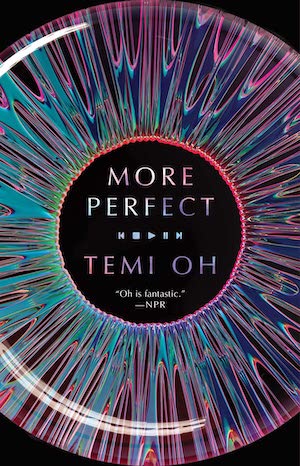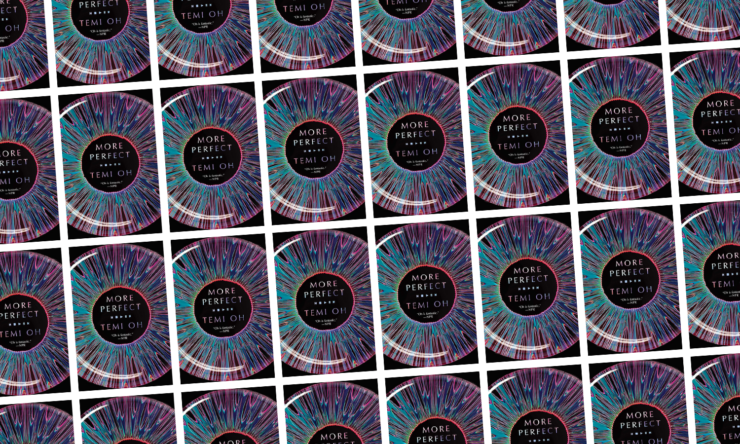Reading dystopian hypersurveillance fiction is always uncomfortably personal for me because it’s already a present-day reality in a lot of cities; I live in Singapore, where the government seized the opportunity to get extra-Orwellian extra-fast during the pandemic, and still channels the colonizing English nanny state in both its laws and stiff reverence for political decorum. And so, I take awkward steps into the first few chapters of Temi Oh’s second novel More Perfect—a reimagined take on the Orpheus and Eurydice myth set in a near-future London where almost everyone has a life-changing neural implant called a Pulse.
That we’re seeing a distinct new crop of AI-inspired fiction is not surprising, especially on the heels of the Mrs. Davis series that poked and prodded at our lazy surrender to mass AI-powered convenience over privacy, individuality, and other such silly ethical concerns. It explores the way we’re conditioned to acquiesce to an overwhelming majority that just wants to get on with their lives, and the gauntlet of frustrations for those clinging on to bits of analog autonomy, all presented as slice-of-life comedy-drama that veers into world-shattering existential crises. Mrs. Davis was more or less an exercise in how much absurdist self-awareness you could stuff into a show riffing on belief and religion, focusing on a nun who refuses to adopt a universally loved and glorified piece of technology. More Perfect plays with similar issues of faith and devotion without the relentless wackiness, and Oh’s background in neuroscience here makes a powerful difference to the story’s tone and depth.
Buy the Book


More Perfect
The novel’s marketing as a retold Greek legend was a strong initial compeller—a succinct elevator pitch in a growing sea of dark coming-of-age stories that live on the fringe of YA. In Greek mythology, Orpheus was a singular bard and musician who married his love Eurydice; when she unexpectedly dies, he ventures to the underworld to try and get her back. His talent for music wins over Hades, and he’s allowed to leave with Eurydice following behind him, on the condition that he doesn’t turn to look at her. It’s pretty obvious what happens.
But this mythological parallel is the least compelling thing about More Perfect. It’s Oh’s compelling characterizations that really shine and make the novel a moving study of love, individuality, and identity. The two doomed lovers here are Moremi and Orpheus. The former is a complicated middle child and aspiring ballerina, and the latter is raised in hiding by his rigid, enigmatic father. They meet and fall in love against a shifting backdrop of controversial corrective dream therapy, childhood trauma, and ever-present technofascism. The lovers are barely full-fledged adults when they spontaneously decide to get married, and Oh’s prose grounds the story in small but evocative scenes that really flesh out a fragile present.
More Perfect, while not what I initially expected, was a slow-burn surprise in many ways. I feel like there’s a sort of Moore’s law where we’ve finally caught up to the Big Brother dystopia that has defined a subgenre for decades and I need something more; maybe my kneejerk aversion to these themes is a sign of too much cynicism or over-saturation hardness, but it means that more often than not, I can’t or won’t engage with a piece of fiction with the blank-slate openness and attention it deserves. More Perfect certainly starts out as a typical bildungsroman where Moremi, a late Pulse adopter who’s having trouble fitting in and feeling connected to others, gets hurled into a very different life and world in the wake of a catastrophe. Her unaddressed trauma and mental health affects her ability to dance—something she takes seriously, and works as a strong complement to the cerebral focus of the Pulse storyline. Her job as a pollinator—a really lovely bit of worldbuilding here in an insectless landscape—takes its toll on her mind and physique.
Oh’s science-driven approach to the book’s phenomenon of dreamscaping, as well as her sharp understanding of the way science is spun up and polarized into political talking points, elevate the story into something more substantial than a simple surveillance thriller with YA overtones. Her biggest success is making Moremi’s journey a suitably unpredictable one, even if it ultimately fulfills the biggest tragedy of the Orpheus myth; as corny as it is, it really does boil down to how she gets there. Moremi’s isn’t an easily likable protagonist, or a straightforward one, and her tendency to toe the party line out of some sense of neutrality or detachment is immediately relatable, if only because it reminds me of people in my own life. Orpheus too, is full of contradictions, and, when they finally meet and share their dreams, a serious and potentially dangerous choice.
After they essentially fuse their memories together, Moremi and Orpheus’ relationship takes on the kind of doomed timbre that you might expect in a gothic romance .They can’t live without each other, yes, but it’s hard to tell if it’s technology that’s made them feel sickeningly codependent and manic and needful. Some of Oh’s best writing is wrapped up in these moments, and it is with some disappointment (but no real surprise) that the end of the book veers away from this hypnotic, chaotic dynamic into a traditional scene of closure. This is, after all, a story about growing up, but I can’t help but feel that Moremi’s finale was somehow lacking.
If anything, More Perfect’s secret recipe doesn’t rely on the myth that Orpheus is named for, but from a much more ordinary source: the Welsh poet Dylan Thomas’ famous radio play Under Milk Wood, which takes listeners through the myriad dreams of a small fishing village. Thomas is named several times as Orpheus’ father’s favorite writer; through this lens, it is possible to fully appreciate what Oh has done with the small wants and unspoken desires and petty madness of her ensemble cast. Moremi’s dysfunctional but close sisterhood is a vital anchor in this version of London, with the three girls pulled in vastly different directions. Where it’s heavy-handed and occasionally over-expository with its dystopian concepts, it compensates via gentle, careful scenes that evoke the most dramatic themes in Thomas’ work: life, death, and above all, the fragile cycles that we find ourselves repeating all over again.
More Perfect is published by Saga Press.
Read an excerpt.
Alexis Ong is a freelance culture journalist with weak ankles who mainly writes about games, tech, and pop culture. Her work has appeared in The Verge, Polygon, Kotaku, Rock Paper Shotgun, VICE, Dazed Digital, and more; soft spots include science fiction, internet archaeology, comics, boxing, and old games. You can find her at her website or on Twitter.










